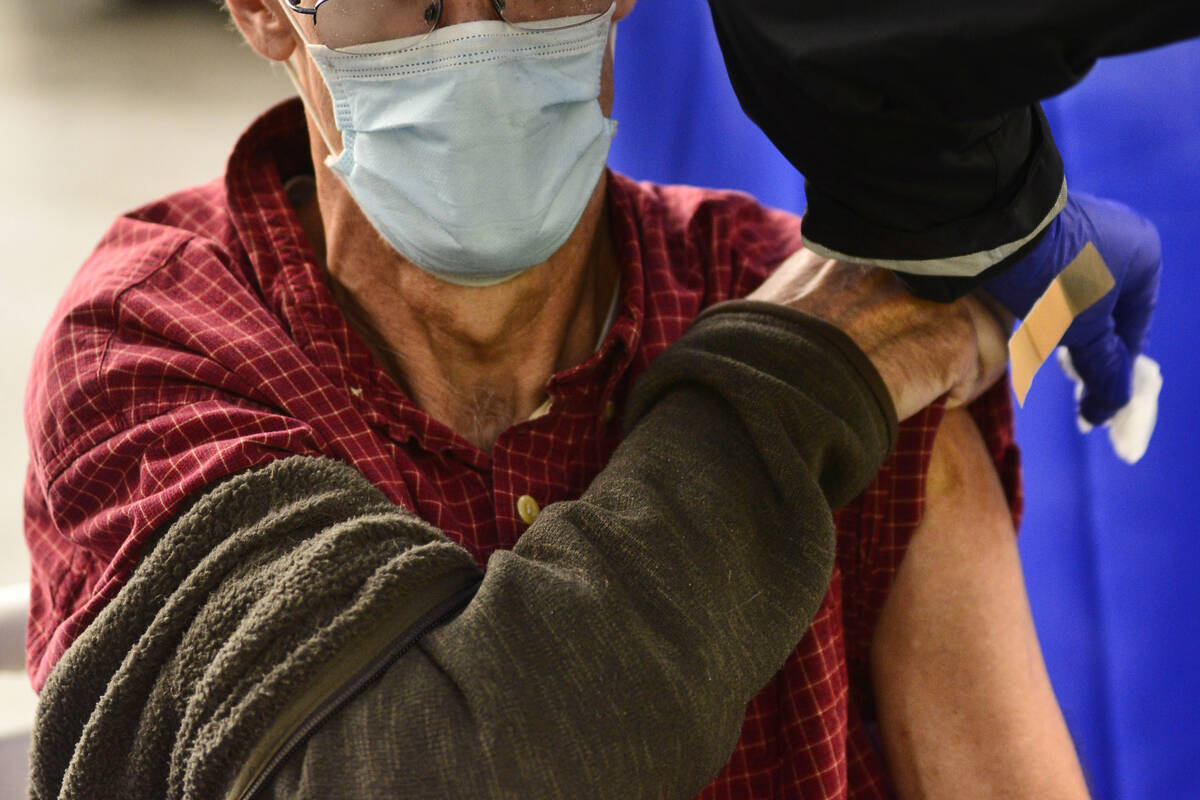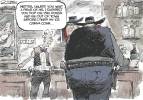Holiday health tip: Don’t kiss the baby
As cases of COVID-19 edge up this week, health authorities are urging people to take precautions as the Thanksgiving holiday approaches.
The time is now, they advise, to get a flu shot or the updated bivalent COVID-19 booster, especially for those 65 and older or with a compromised immune system, groups more likely to become seriously ill.
“With the triple threat of seasonal flu, COVID-19 and RSV looming, we’re advising people to get their flu vaccine and updated COVID-19 boosters before their Thanksgiving get-togethers,” Dr. Fermin Leguen, district health officer for the Southern Nevada Health District, said in a news release. It takes about two weeks for a vaccine to provide full protection.
Authorities also are recommending renewing those preventive practices established earlier in the pandemic, including the use of at-home rapid tests before a gathering.
The guidance comes as COVID-19 cases and hospitalizations have risen in recent weeks both statewide and in Clark County.
This week’s increase in new cases in the county is small compared with last week’s hefty hike of 42 percent. The 14-day average for daily new confirmed cases increased to 177 from 167 in Clark County, according to new data Wednesday from the Nevada Department of Health and Human Services. Statewide, confirmed daily new cases increased to 231 from 208.
Confirmed and suspected hospitalizations dropped to 202 from 209 in the county, according to data from the state. Statewide, hospitalizations dipped to 254 from 256. The 14-day average for daily new deaths in both Clark County and the state was one.
Patients complaining of COVID-19 symptoms represented 13 percent of visits statewide to the emergency room this week, an increase of 1 percentage point, the Nevada Hospital Association said. Flu hospitalizations, which increased to 40 from 30 statewide, “are not overburdening the system,” according to the association.
Hospital pediatric units continue to be strained by respiratory illnesses, including respiratory syncytial virus, a common illness that typically produces mild, cold-like symptoms but can be serious for infants and younger children. The occupancy rate of designated pediatric hospital beds statewide is at 110 percent. The occupancy rate is 100 percent for pediatric intensive care beds, the hospital association said.
It could become necessary to enact crisis standards of care, which would allow pediatric beds to expand further on adult floors and allow non-pediatric hospitals to see older children, the association said.
“The overall hospital capacity remains in good condition, with pediatric capacity being strained but not in danger of collapse,” it said.
Health authorities are crossing their fingers that holiday gatherings won’t lead to a spike in cases of COVID-19 and other respiratory viruses. They offers these tips:
Get boosted
The health district recommends that those ages 5 and up get an updated bivalent booster if it has been at least two months since their last dose of either the primary series or the original booster. A flu shot can be given at the same time.
As of Nov. 9, just 13 percent of eligible Nevadans had received an updated bivalent COVID-19 booster, said Marissa Medeiros, public information office for the state’s immunization program.
Mask up
Because those 65 and up or with a compromised immune system are more likely to become severely ill from COVID-19, the health district advises them to wear a high-quality mask such as an N95 or KN95.
Younger, healthier people may want to consider masking to protect more susceptible people around the holiday table.
Epidemiologist Katelyn Jetelina, who writes the popular “Your Local Epidemiologist” newsletter, said she will be wearing an N95 mask in public for the next week to “help ensure we don’t bring COVID-19 (or flu) to Thanksgiving dinner.”
Take a test or two
Jetelina said she and her family will be using COVID-19 at-home antigen tests two days before seeing older relatives, and again the morning of a gathering, to ensure they aren’t exposing their elders.
“You won’t know unless you test,” she said in her newsletter.
Test or no, anyone with symptoms should also stay home, she said
Avoid indoor crowds
Crowded indoor spaces pose a greater health risk, especially for those already at heightened risk.
Indoor air ventilation and filtration are “powerful tools” for preventing illness, Jetelina said. “This is especially important in the middle of winter when people head indoors.”
Don’t kiss the baby
Older adults aren’t the only ones at risk. Parents of infants under the age of 6 months need to be concerned not only about COVID-19 but about RSV and flu, Jetelina said. Her holiday tip?
“The biggest advice I have for you is not to let people kiss or hold your baby. They’ll live,” she said about the would-be kissers and holders.
Contact Mary Hynes at mhynes@reviewjournal.com or 702-383-0336. Follow @MaryHynes1 on Twitter.





























